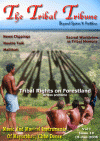Nature Talk
|
June 5 is observed as Environment Day. In tropical India, by the second week of the June, the spell of hot days begins to subside with advent of southwest monsoon. The plants revive again and animals including humans get relief. Natural forest, which is ever decreasing in India, rejuvenates. Often the tribal communities living inside declared forestland are blamed for wanton destruction of forest. The government formulated forest protection laws and the tribal people are dissuaded to hunt game animals, collect wood fuel and minor-forest materials like leaves fruits and flowers. The tribals are considered as encroachers. This is similar to declare fishes as unwanted inhabitants of protected water bodies. Much before the formulation of forest protection laws, many tribal people made hilly jungles as their homeland. These aboriginal citizens depend on natural resources for their sustenance. They do not require wood to decorate their huts with furniture. They clear thickets on hill slopes or upland for cultivation of crops, sparing valuable trees. Of course sometimes, the forest fire produced by them engulfs some vegetation. The law enforcing civilized people take these actions by the tribal people as main cause for depletion of forest. But those who have intimate knowledge about the tribal way of life know how colored is this view. The tribal people are depicted as the villain of the forest to cover up the malpractice of the timber merchants. The forest department people are either silent spectator or passive collaborator. More valuable trees are felled than actually permitted. The economically deprived tribal people are engaged by the wood-smugglers to carry out these unlawful activities. So when forest guards spot them, the original culprit remain unscathed. Many seminars and brain storming discussions have so far been held and many more methods to stop this malpractice have been prescribed. A method to involve the local tribal people in the protection of forest has been implemented with partial success. The famous ‘Chipko’ movement by the tribal women showed way. On last June 5, a news channel showed that tribal women in Orissa have come forward to protect their neighborhood forest from illegal felling of trees and poaching of animals. As tribal women are deeply associated with forest collection, they have taken the initiatives to protect their source of livelihood. Men also, reportedly back them. The so-called ‘civilized’ people, who think globally, often ignore the views of ‘backward’ aborigines regarding environment protection. These people whose existence is intermingled with immediate environment, have their own way of understanding the pulse of nature and never cause extensive damage. They do not hunt female animal or floral species on which animals depend. They propitiate earth, fire, rivulets etc. The designing of regional rituals and customary habits are adaptive to all natural environments. It is the activities of the ruling ‘developed’ people, which cause extensive damage to the environment in the name of industrialization in cheaper way. |
Photographs :
References :



